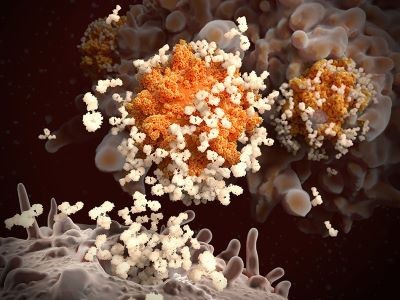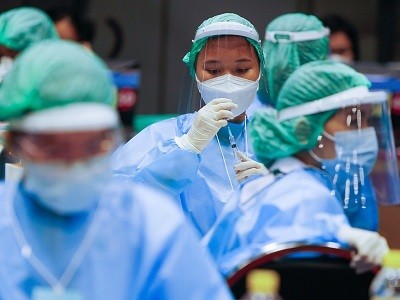The unvaccinated can expect to continue to be reinfected with Covid every year or two.
Eventually, it may kill them. JL
Lynne Peeples reports in Nature:
People who have been infected with SARS-CoV-2 can expect to become reinfected within one or two years, unless they take precautions such as getting vaccinated and wearing masks. That’s the prediction of modelling based on the genetic relationships between SARS-CoV-2 and other coronaviruses. The findings also warn that people could be reinfected in just a few months if they are not vaccinated. “Immunity is relatively short-lived.” The average reinfection risk rises from 5% four months after initial infection to 50% by 17 months.People who have been infected with SARS-CoV-2 can expect to become reinfected within one or two years, unless they take precautions such as getting vaccinated and wearing masks. That’s the prediction of modelling based on the genetic relationships between SARS-CoV-2 and other coronaviruses1.
The findings also warn that people could be reinfected in just a few months if they are not vaccinated. “Immunity is relatively short-lived,” says study co-author Jeffrey Townsend, a bioinformatician at the Yale School of Public Health in New Haven, Connecticut. “You should still get vaccinated even if you got infected.”
Further data over the coming months, and years, will be necessary to know precisely how long natural immunity lasts. “But we don’t want to wait for that. And we don’t have to,” says Townsend.
To estimate the durability of SARS-CoV-2 immunity, he and his colleagues wanted to understand how antibody levels from a previous infection affect the risk of reinfection. Data from an earlier study2 allowed the team to chart this effect over years for ‘endemic’, or continually circulating, coronaviruses that cause the common cold. But SARS-CoV-2 is too new for such long-term data to be available.
To fill the gap, the scientists combined genetic data from SARS-CoV-2, three endemic coronaviruses and the closely related coronaviruses SARS-CoV and MERS-CoV to build a viral family tree. The authors then used that tree to model how viral traits have evolved over time. Together, these traits provided an estimate of the decline in antibody levels after SARS-CoV-2 infection, and of other factors needed to understand reinfection risk.
The results suggest that the average reinfection risk rises from about 5% four months after initial infection to 50% by 17 months. Overall, natural protection seems to last for less than half as long as it does for the three common-cold coronaviruses.
Townsend says he was “surprised and daunted” by his findings, which suggest that COVID-19 is likely to transition from a pandemic disease to one that’s endemic.
COVID-19 wild cards
Still, many unknowns remain, including the probable severity of disease when someone is reinfected. Individuals can also vary significantly in both their susceptibility to reinfection and, if reinfected, their disease course — including whether they are likely to get long COVID.
Sarah Cobey, an evolutionary biologist at the University of Chicago in Illinois, cautions that the new research relies on the assumption that viruses’ genetic similarities predict similarities in traits relevant to reinfection. She notes that it might be too soon to make a confident statement about how quickly protection declines after a SARS-CoV-2 infection. But she adds that the science suggests that protection will indeed wane: “Nobody would expect immunity to last that long with a virus that is specifically evolving to escape immunity.”
Cobey also underscores the need for people who have been infected to bolster their protection with a vaccine — a point driven home by research published by the US Centers for Disease Control and Prevention in August. The study looked at people who got COVID-19 in 2020, some of whom became reinfected in May or June 2021. It found that those who had not had a vaccine were more than twice as likely to get reinfected in that period as those who had both the virus and a vaccine3.






















0 comments:
Post a Comment